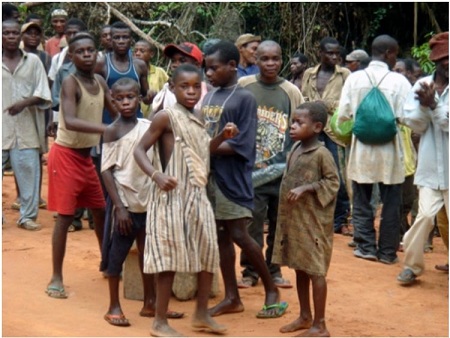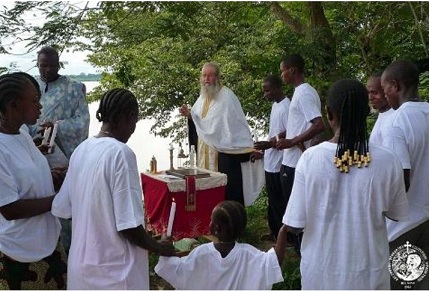From the window of the Boeing 737 I could see the equatorial jungle below, shrouded in its misty cloak like a green, endless sea. I brought to mind all of God's beautiful creations—rational and irrational—that live inside it. After about a one-hour and fifteen minute flight we landed—almost brushing against the tops of mighty, tall trees—when the Impfondo (Republic of Congo) airstrip suddenly appeared before us.
 |
Theirs was a lively daily participation in Matins and Great Vespers. During the Divine Liturgy of the Annunciation and the Veneration of the Cross, the house we had rented was filled with the neophytes, inside and out. Their souls were likewise filled with the truths of our Faith that pertained to our Holy Mother and the Precious Cross, during the catechesis that followed. Whatever the Lord inspired us to say, they heard in three different languages: in French, for those who went or were going to school; in Lingala, for many of the women and the illiterate, and in the language of the Baâka Pygmies, as the locals call them. Pygmies are numerous among our faithful, and are very punctual churchgoers. They are many in number among the inhabitants of Impfondo, having created two districts at the edges of the town.
In mid-March, the government organized a different kind of forum for the Pygmies. Camps and gathering spots were created outside the city, as well as an amphitheater for the official events. Many visitors arrived and huge expenses were made. The theme: the recognition of the rights of the Pygmies and their acceptance as equal members in local communities. They were also allotted a section of the jungle next to the river, where they built their huts. In that way their position amidst the Bandu, the other Africans, was officially ameliorated, however, not their finances, as nothing was left over from the money that had been plentifully dedicated. They continued coming to Church wearing dirty rags. That was the reason we organized a committee of the faithful and purchased and distributed (intact, albeit second-hand) garments from the bazaar. They were the clothes that they wore to their Baptism also.
On the 26th of March, on the banks of the River Ubangi, I performed the third group Baptism at Impfondo. Among the catechumens, twenty-seven were prepared, of whom the twelve were little children. The seventeen were Bandu, of which the ten were Pygmies—four men and six women.
Once again, a pirogue was used as a platform, so that the water would be deep enough at the point of Baptism (immersion). Quite a number of faithful had come and several of our Pygmy catechumens were also present, observing the Baptism Sacrament and rejoicing together with those being baptized. They sat under the shade of the huge trees on the banks of the river. We, however, were being observed by the scorching hot gaze of the equatorial sun, as well as by the fishermen who passed by us with their pirogues.
 |
During the Divine Liturgy of the Veneration of the Precious Cross, the twenty-seven newly baptized took Holy Communion first, and afterwards, almost all of the faithful. Refreshments were offered, and a homily on the Precious Cross was delivered. The Pygmies sang their joy and danced, in their own distinct tradition.
However, my own joy was made complete with the postponement of my flight the next day, giving us the opportunity for a further, 4-day stay in that traditional African town, where a primitive bicycle helped me to become better acquainted with it, but also for conditions to mature for the purchase that same day of the property on which the church of Saint Mark will be erected.
Africa's protector-Saint, the Evangelist Mark, will hereafter look after the new Orthodox community, securing its continuity and ensuring that the dreams of our brethren there will be materialized.
Hieromonk Theologos
